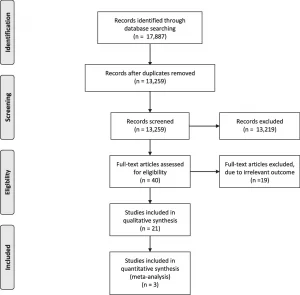A comprehensive meta-analysis recently explored the association between breastfeeding and mental health outcomes, evaluating the risk of mental disorders such as depression and anxiety in both mothers and children. This systematic review, which included 21 studies, aimed to determine whether breastfeeding confers any protective effect against these mental health issues. The review’s findings were mixed and somewhat inconclusive, with many studies reporting conflicting results. Despite some evidence suggesting that breastfeeding may reduce the risk of maternal depression and improve child mental health, the overall certainty of this conclusion was limited due to inconsistent study methodologies and variations in the populations studied.
Further reading: Maternal Influenza and Fetal Neurodevelopment
In mothers, the studies suggested a potential link between breastfeeding and a lower incidence of postnatal depression. However, this association was not found consistently across all studies. Some evidence indicated that breastfeeding could act as a protective factor due to hormonal regulation, increased mother-infant bonding, and psychological benefits linked to successful breastfeeding experiences. Nonetheless, several studies also showed no significant correlation between breastfeeding and mental health improvement, particularly in mothers who experienced difficulties or stress related to breastfeeding. The review suggested that the benefits of breastfeeding for maternal mental health might be influenced by additional factors, including social support, previous mental health conditions, and cultural expectations around breastfeeding.
For children, the review examined whether breastfeeding contributed to improved mental health outcomes, including a lower risk of anxiety and depression in later life. Again, the findings were inconsistent. While some studies proposed that breastfeeding provides long-term psychological benefits for children, potentially due to enhanced bonding, nutritional advantages, or early-life nurturing experiences, other research did not find a significant association. The certainty of the evidence was weakened by the variation in follow-up periods, study designs, and outcome measures used to assess child mental health.
One significant limitation identified in the review was the heterogeneity of the studies. Differences in sample sizes, study designs, and methods of mental health assessment made it challenging to draw definitive conclusions. Furthermore, while breastfeeding may have potential psychological benefits, its impact may also be moderated by external factors such as maternal mental health prior to birth, socioeconomic conditions, and the overall quality of the mother-child relationship.
The review concluded that while there is some evidence to suggest that breastfeeding may have a protective role against mental health disorders in both mothers and children, the current evidence base is insufficient to make strong recommendations. Future research with more rigorous study designs and longer follow-up periods is needed to clarify the association between breastfeeding and mental health outcomes.
Journal Article: Polina Bugaeva, et al. “Association of Breastfeeding with Mental Disorders in Mother and Child: A Systematic Review and Meta-Analysis.” BMC Medicine, 2023.
Summary by Faith Oluwamakinde











